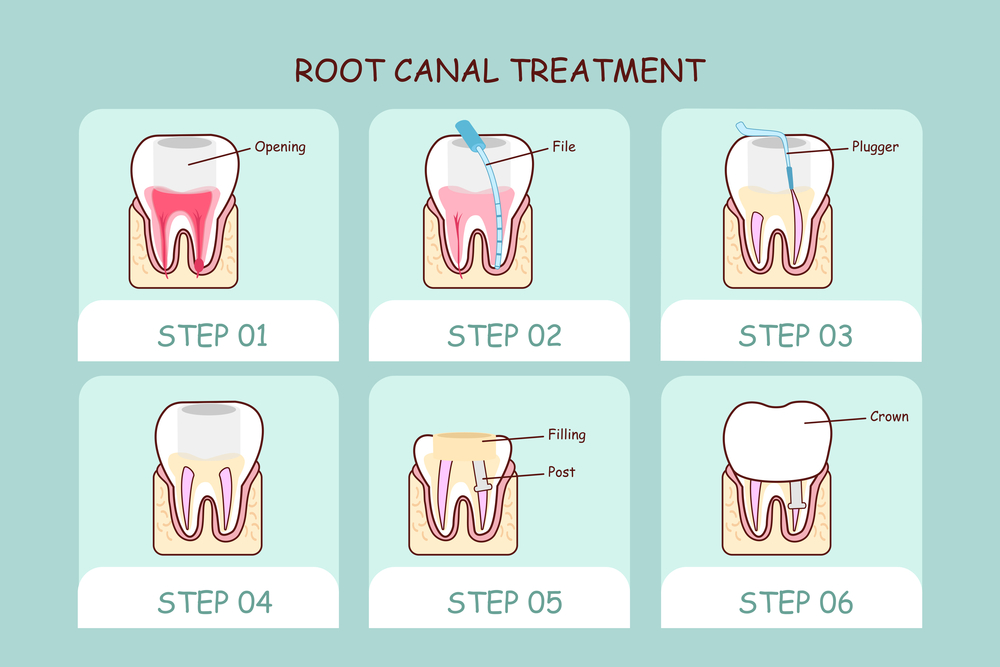Hearing that you require a root canal treatment is perhaps one of the most dreaded procedures at our dental practice. Most of us fear the procedure because of the exaggerated claims regarding the level of discomfort and pain associated with it.
However, having an accurate and clear idea about the procedure can help decrease any irrational fears we might have. Furthermore, it makes the treatment procedure easier and more convenient for our dentists and patients. We highlight facts about this treatment to dispel any accompanying myths.
Root Canal Saves Your Teeth
An infected tooth can cause considerable pain, and many people simply presume the best course of action is tooth extraction. However, the best dentist for dental implants Plantation will inform you that this isn’t the case.
A tooth extraction isn’t the best option, particularly since extraction can frequently cause tooth loss in the future. A root canal seeks to eliminate infection without endangering your tooth. When performing this procedure, we’ll eliminate the infected pulp at the tooth’s root while it remains in place.
With proper care, the tooth will last for a long time. This procedure is less painful than a tooth extraction and doesn’t involve tooth removal, which can cause issues with speaking and chewing.
It’s Necessary to Prevent an Infection
When you don’t seek root canal treatment for an infected root, you face the risk of bacteria spreading beyond the tooth. It can reach your bone, gums, and your bloodstream. Once the bacteria extends beyond your tooth, you could end up with an abscess-a severe infection that’s extremely dangerous.
An abscess can become extremely painful very fast, and can destroy bone and gums. The best dentist for dental implants Plantation will inform you that an abscess needs immediate treatment to avoid jeopardizing the health of your mouth. Don’t avoid this procedure hoping that will be improve; it won’t.
It Saves Money and Time
A root canal is quick and simple, only requiring a dental implant procedure Plantation for tooth restoration and protecting the remaining healthy segment. Most of us consider this procedure an inconvenience or something to fear. However, you’ll discover it saves time and money besides being a tooth-preserver and pain-reliever.
A Root Canal Isn’t as Painful
Most of us associate this procedure with pain, and the thought of us extracting infected pulp from your tooth might sound terrifying. In reality, this procedure is very routine and modern dentistry permits our staff to complete the procedure without causing discomfort. Throughout this procedure, we ensure our patients are under anesthesia, so our patients barely feel any pain. In fact, you’ll feel more pain if you leave your infected canal untreated.
Aftercare is Necessary
While a root canal might save your tooth, it weakens it as well. Therefore, we encourage our patients to take care of that tooth to make sure it doesn’t fall of or break eventually. Ideally, we’ll attach a crown during a dental implant procedure Plantation for additional protection. You want to ensure you follow your dentist’s instructions to implement proper tooth care after treatment.

Signs You Need a Root Canal
Persistent Pain
If you experience persistent pain in your tooth, you might require a root canal. The tooth pain might bother you or fade occasionally only to return. You might experience the pain deep in your tooth’s bone, or you might experience referred pain in the jaw, face, or in other teeth.
Tooth pain might have various sources besides the root canal. Other possibilities include a cavity, damaged filling, and gum disease. Regardless of the cause, we recommend you see the best dentist for dental implants Plantation if you experience tooth pain, particularly if it’s persistent. It’s worth noting that early treatment and diagnosis for tooth pain usually results in a better outcome.
Tooth Discoloration
An infected tooth pulp can cause tooth discoloration. Trauma to your tooth or internal tissue breakdown can cause root damage, giving your tooth a grayish-black appearance. This discoloration is easier to spot in a front tooth. Beware that a tooth pulp can die once there’s an insufficient blood supply, signaling a need for a root canal. While tooth discoloration can arise from other causes, we recommend you schedule a visit with the best dentist for dental implants Plantation if you notice your tooth is changing color.
Pain sensation when you touch the tooth or eat
If you experience tooth sensitivity when you eat or touch the tooth, it could signify nerve damage or serious tooth decay, which might need root canal treatment. This is particularly the case if there’s persistent sensitivity over time and doesn’t subside once you stop eating.
Swollen Gums
If you notice swollen gums next to the painful tooth, this could indicate the need for root canal. The swelling might be tender to the touch or you might not experience pain upon touching it. You might also notice a small pimple on the gum otherwise called an abscess or gum boil. The pimple might ooze pus from the infected tooth, leaving an unpleasant taste in your mouth and bad breath.
A cracked or chipped tooth
If you’ve cracked or chipped your tooth during contact, sport or an accident, bacteria can penetrate, leading to infection and inflammation. Even if you experience tooth injury, but it doesn’t crack or chip, the injury might still cause nerve damage. In turn, the nerve can exhibit inflammation, causing sensitivity and pain, which might need root canal.
A root canal treatment simply cleans out decay and preserves the infected tooth. While the dental implant procedure Plantation attracts a lot of myths, you want to familiarize yourself with these facts, so you can seek treatment early.







